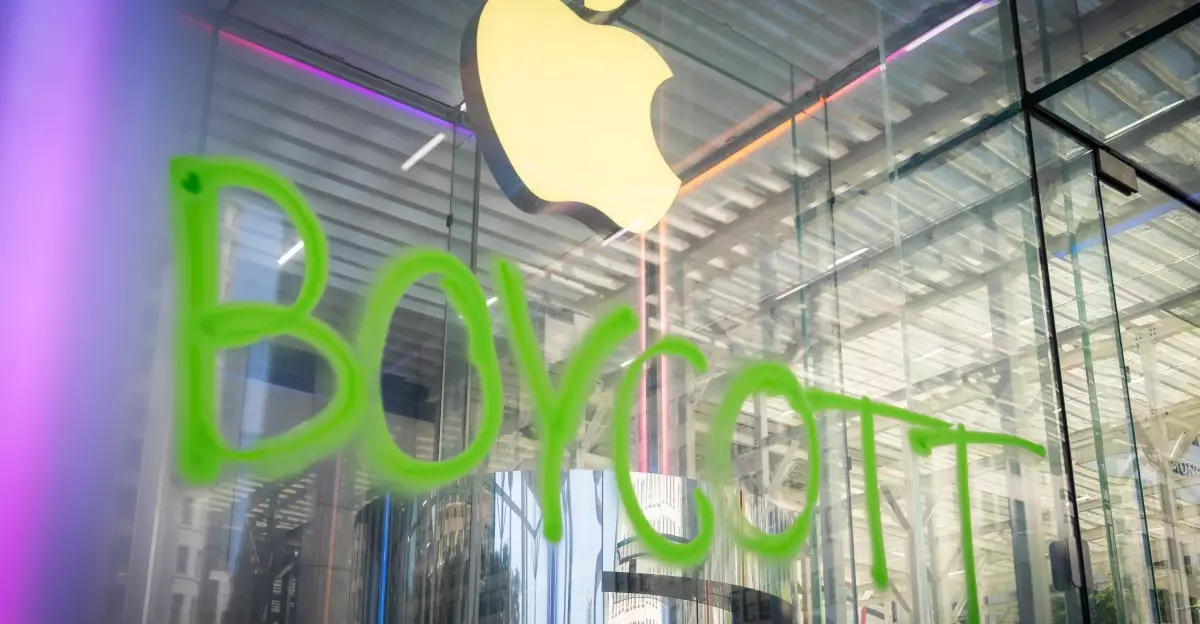In a bold but ultimately symbolic gesture, Extinction Rebellion activists staged a provocative demonstration outside Apple’s iconic Fifth Avenue store, spray-painting provocative messages like “Tim + Trump = Toxic” and “Boycott” beneath the famed logo. While such acts grab headlines and stir public debate, they often do little to address the systemic issues at play. The arrest of an activist, although necessary to uphold laws, pales in comparison to the magnitude of the environmental crisis at hand. Once again, the protesters’ tactics serve more as a dramatic curtain-raiser than a genuine solution. Rather than fostering meaningful change, these actions tend to breed polarization, allowing corporations to dismiss critiques as theatrics rather than accountability.
Big Tech and the Climate Hypocrisy Dilemma
The core accusation leveled by Extinction Rebellion targets a profound contradiction: while CEOs of Apple, Google, and Meta publicly champion climate initiatives, their actions tell a different story. The group claims that these corporations once lauded the Paris Agreement but now actively support policies that undermine environmental protections—support that materially benefits fossil fuel interests and global warming denial. This disconnect exposes a staggering gap between corporate rhetoric and real-world impact, highlighting how the wealthy and powerful often engage in “virtue signaling” rather than implementing substantial change. It’s not just about superficial commitments; it’s about genuine leadership that aligns action with words.
The Power and Peril of Symbolic Resistance
What’s striking about Extinction Rebellion’s protest is the choice of symbolic acts—spray-painting slogans on storefronts and chanting slogans inside stores. These are effectively “performance protests” that seek to rally media attention and public discourse but rarely translate into tangible policy shifts. When corporations are publicly called out for their climate hypocrisy, the narrative becomes polarized: on one side, passionate activists; on the other, corporate spin. Yet, history suggests that sustained pressure—beyond provocative acts—is necessary to catalyze real change. Activists risk reducing their movement to a performative spectacle instead of a practical force capable of influencing corporate boardrooms or government policy.
The Deepening Crisis of Corporate Environmental Responsibility
Beyond the protests, a more troubling trend lies beneath the surface: the unchecked environmental impact of technological expansion. As AI deployment accelerates, so does energy consumption, adding new layers of environmental strain. Companies like Google and Microsoft, once champions of sustainability, are now caught in a paradox—investing heavily in AI and cloud services that threaten to escalate their carbon footprints. The assertion that these firms prioritize climate action appears compromised when their expanding data centers and AI infrastructure demand millions of tons of electricity, much of which still comes from fossil fuels. The disconnect underscores a critical flaw in the “pledge” culture, where promises to reduce emissions are often overshadowed by the appetite for technological dominance and profitability.
Ownership and Accountability in Climate Leadership
Perhaps the most damaging element of the current situation is the blatant support some tech leaders lend to political figures who actively roll back environmental regulations. Apple’s Tim Cook, who publicly claims climate change is “the defining challenge of our time,” apparently donates to political figures advocating for policies that undo environmental protections—most notably, Trump’s administration. This contradiction raises fundamental questions about the sincerity of corporate commitments. Are these statements a form of performative virtue signaling that masks an underlying allegiance to business interests over planetary health? Without transparent accountability, these contradictions undermine trust and weaken the moral authority of corporate climate initiatives.
Reimagining Corporate Responsibility
Real change demands more than protests and empty promises. It requires a fundamental reorganization of priorities within corporations. Tech giants must move beyond rhetoric and integrate climate responsibility into the very fabric of their operational models. This involves investing in renewable energy, advocating for robust environmental policies, and aligning their growth strategies with global sustainability goals. Moreover, consumers must demand transparency and accountability, pushing these corporations to act in ways that genuinely reduce their environmental impact—beyond superficial gestures designed for PR. The future of our planet depends on whether we can hold these institutions accountable and challenge the false narrative of greenwashing that currently dominates.
—
This critique reveals the layered complexity behind climate activism involving Big Tech. While protests surface urgent concerns, they often fall short in catalyzing sustained, systemic change. Only through unwavering accountability, genuine corporate reform, and a collective push for transparency can we hope to transcend symbolic acts and forge a pathway toward meaningful environmental progress.

